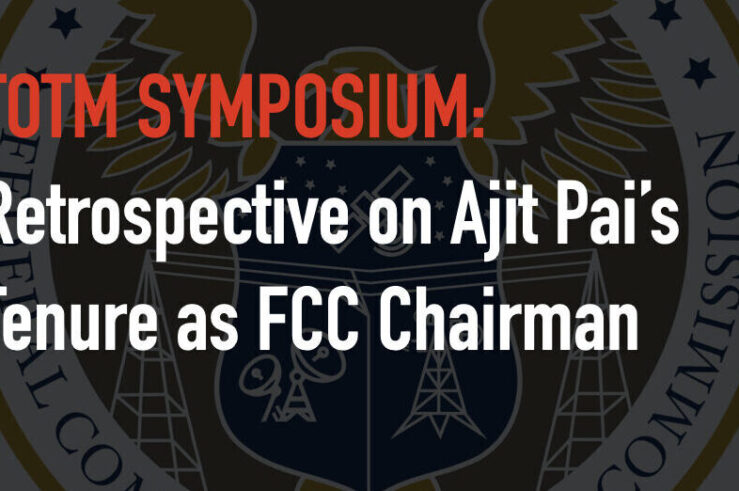Showing archive for: “Telecom”
Ajit Pai and Risk-Taking at the FCC
It would be impossible to describe Ajit Pai’s tenure as chair of the Federal Communications Commission as ordinary. Whether or not you thought his regulatory style or his policies were innovative, his relationship with the public has been singular for an FCC chair. His Reese’s mug, alone, has occupied more space in the American media ... Ajit Pai and Risk-Taking at the FCC
Chairman Pai’s Organizational Legacy
One significant aspect of Chairman Ajit Pai’s legacy is not a policy change, but an organizational one: establishment of the Federal Communications Commission’s (FCC’s) Office of Economics and Analytics (OEA) in 2018. Prior to OEA, most of the FCC’s economists were assigned to the various policy bureaus, such as Wireless, Wireline Competition, Public Safety, Media, ... Chairman Pai’s Organizational Legacy
Chairman Pai’s Legacy of Transparency
For many, the chairmanship of Ajit Pai is notable for its many headline-grabbing substantive achievements, including the Restoring Internet Freedom order, 5G deployment, and rural buildout—many of which have been or will be discussed in this symposium. But that conversation is incomplete without also acknowledging Pai’s careful attention to the basic blocking and tackling of ... Chairman Pai’s Legacy of Transparency
A Reflection on Commissioner Pai, Chairman Pai, and Public Service
Much of this symposium celebrates Ajit’s contributions as chairman of the Federal Communications Commission and his accomplishments and leadership in that role. And rightly so. But Commissioner Pai, not just Chairman Pai, should also be recognized. I first met Ajit when we were both minority commissioners at our respective agencies: the FCC and Federal Trade ... A Reflection on Commissioner Pai, Chairman Pai, and Public Service
Pai’s Legacy of Progress in Closing the Rural Digital Divide
I was having a conversation recently with a fellow denizen of rural America, discussing how to create opportunities for academics studying the digital divide to get on-the-ground experience with the realities of rural telecommunications. He recounted a story from a telecom policy event in Washington, D.C., from not long ago. The story featured a couple ... Pai’s Legacy of Progress in Closing the Rural Digital Divide
Pai Dedicated His Tenure to Improving US Broadband
Ajit Pai came into the Federal Communications Commission chairmanship with a single priority: to improve the coverage, cost, and competitiveness of U.S. broadband for the benefit of consumers. The 5G Fast Plan, the formation of the Broadband Deployment Advisory Committee, the large spectrum auctions, and other broadband infrastructure initiatives over the past four years have ... Pai Dedicated His Tenure to Improving US Broadband
Chairman Pai’s FCC Followed a Sound Process in Approving L-Band Wireless Services
During Chairman Ajit Pai’s tenure, the Federal Communications Commission adopted key reforms that improved the agency’s processes. No less important than process reform is process integrity. The commission’s L-Band Order and the process that produced it will be the focus here. In that proceeding, Chairman Pai led a careful and deliberative process that resulted in ... Chairman Pai’s FCC Followed a Sound Process in Approving L-Band Wireless Services
How Chairman Pai Restored the FCC’s Independence
Chairman Ajit Pai will be remembered as one of the most consequential Federal Communications Commission chairmen in history. His policy accomplishments are numerous, including the repeal of Title II regulation of the internet, rural broadband development, increased spectrum for 5G, decreasing waste in universal service funding, and better controlling robocalls. Less will be said about ... How Chairman Pai Restored the FCC’s Independence
The (Conventional) 5G Chairman
Chairman Ajit Pai prioritized making new spectrum available for 5G. To his credit, he succeeded. Over the course of four years, Chairman Pai made available more high-band and mid-band spectrum, for licensed use and unlicensed use, than any other Federal Communications Commission chairman. He did so in the face of unprecedented opposition from other federal ... The (Conventional) 5G Chairman
Why Restoring Internet Freedom Was a Landmark Accomplishment
I am pleased to participate in this retrospective symposium regarding Ajit Pai’s tenure as Federal Communications Commission chairman. I have been closely involved in communications law and policy for nearly 45 years, and, as I’ve said several times since Chairman Pai announced his departure, he will leave as one of the most consequential leaders in ... Why Restoring Internet Freedom Was a Landmark Accomplishment
Great Job, Kid! (And Welcome to the Private Sector)
Many thanks to Geoffrey Manne for this opportunity to memorialize a few thoughts I have about Ajit’s service on the Federal Communications Commission. My remarks will be more about Ajit as a person rather than the substance and long laundry list of his accomplishments as chair. Others will do that, I’m sure. The first memory ... Great Job, Kid! (And Welcome to the Private Sector)
Introductory Post: Retrospective on Ajit Pai’s Tenure as FCC Chairman
Ajit Pai will step down from his position as chairman of the Federal Communications Commission (FCC) effective Jan. 20. Beginning Jan. 15, Truth on the Market will host a symposium exploring Pai’s tenure, with contributions from a range of scholars and practitioners. As we ponder the changes to FCC policy that may arise with the ... Introductory Post: Retrospective on Ajit Pai’s Tenure as FCC Chairman





